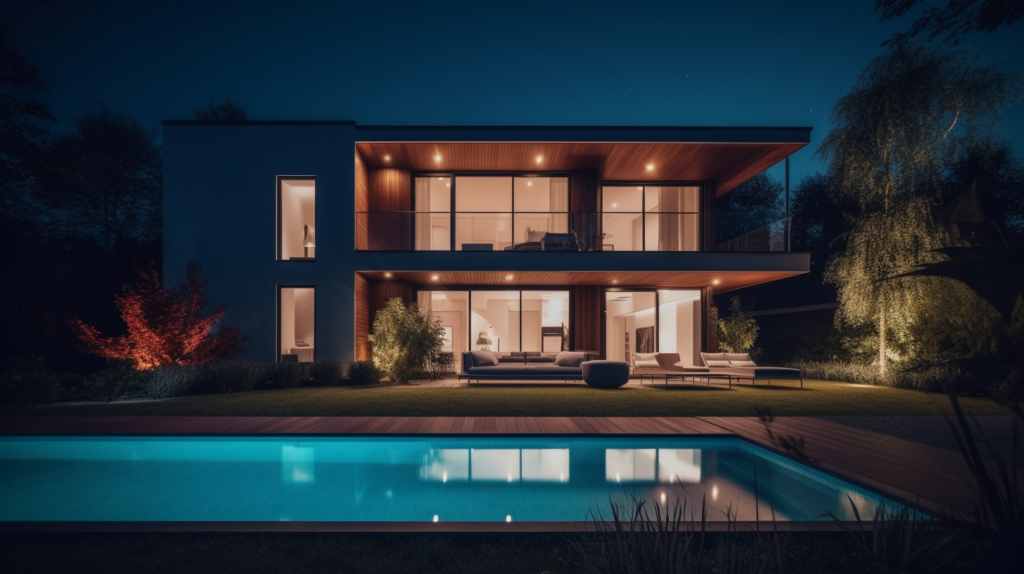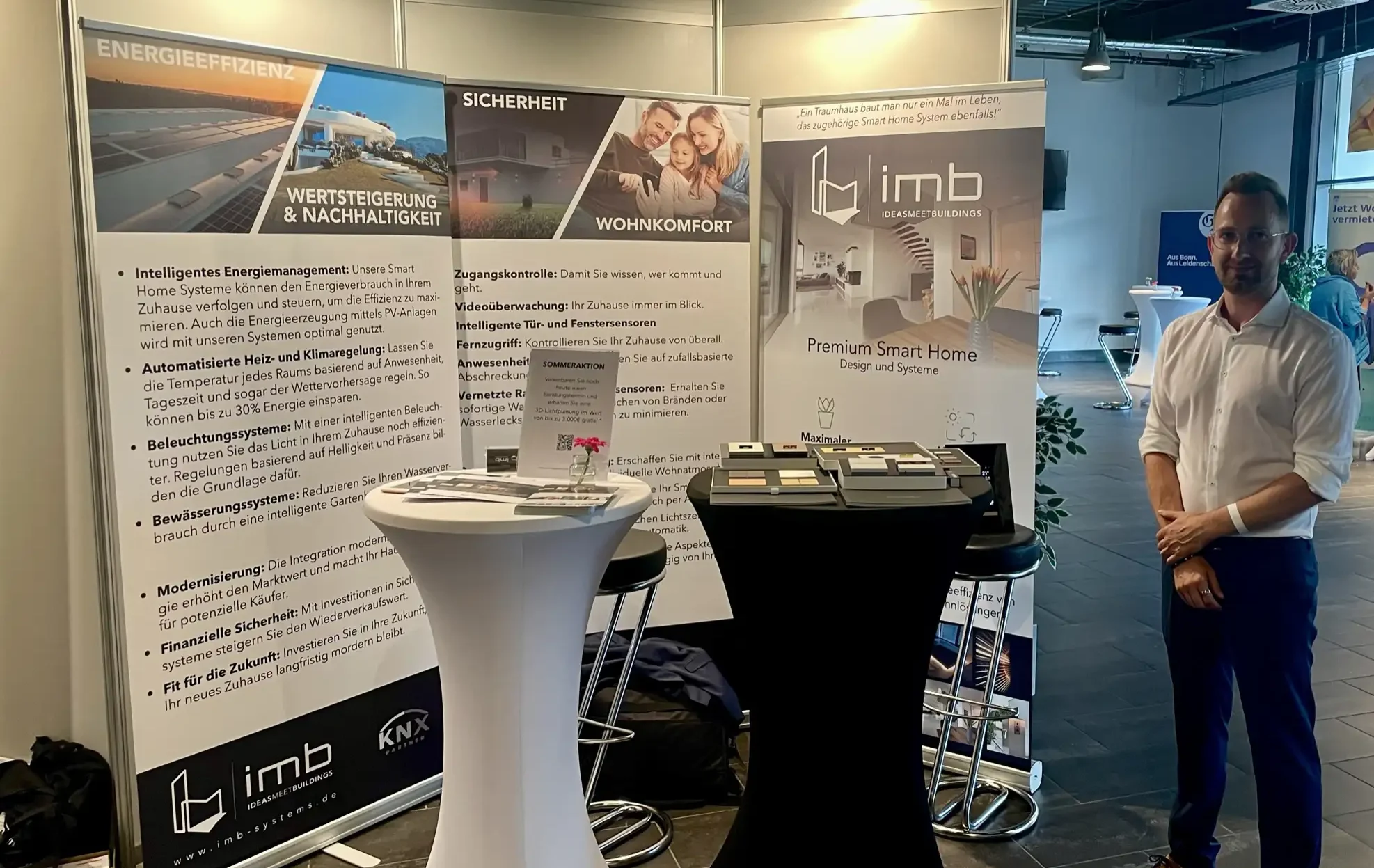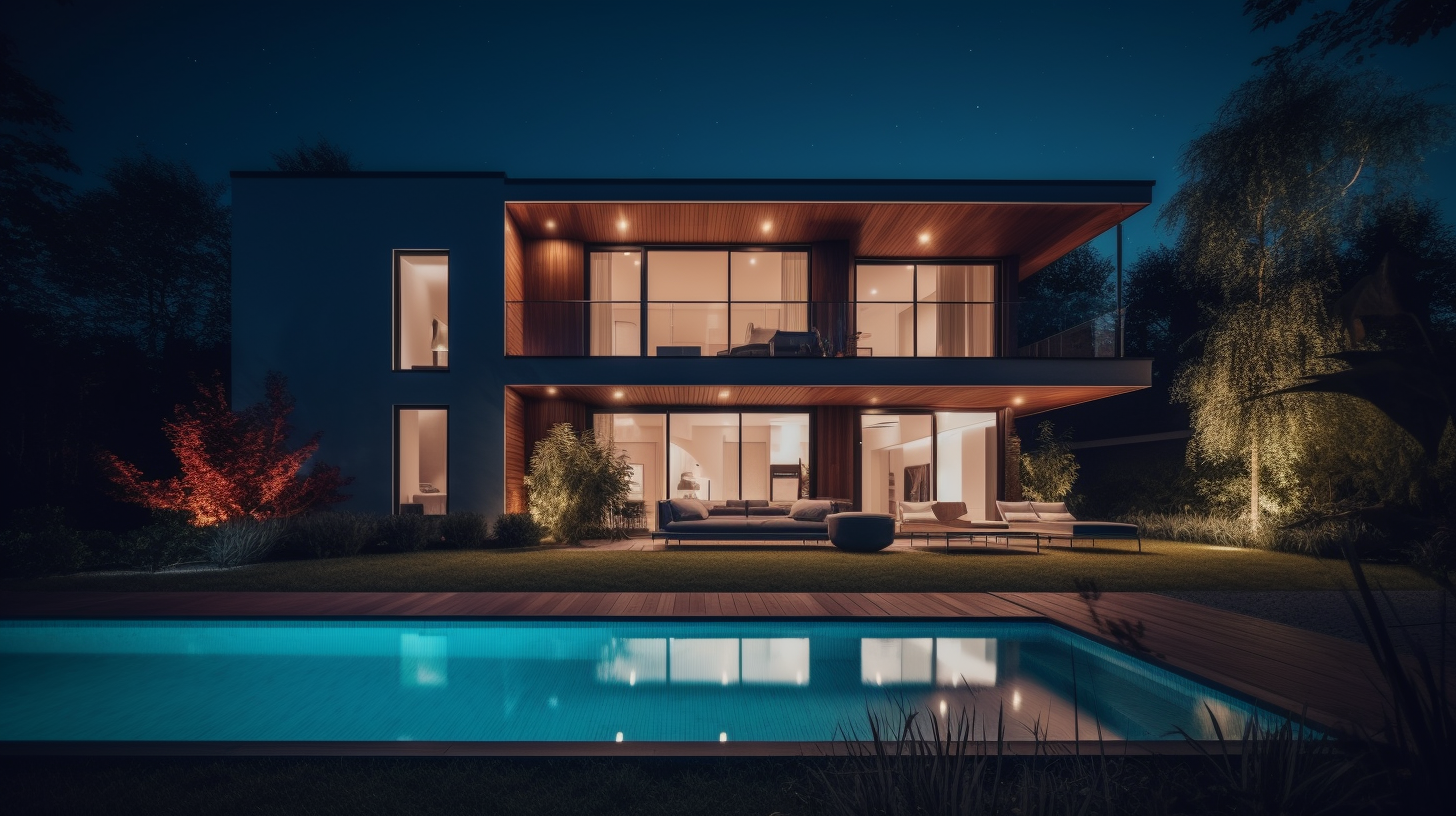Both our customers and many interested parties often ask us very similar questions about smart homes. Here you can find out what challenges other builders and interested parties are facing and can certainly clarify some of your questions.
Have fun collecting ideas!
“Does it make sense to use a radio-based smart home?”
If a retrofit is not part of a core renovation, then yes. For a new build or major renovation, we recommend a wired system based on the KNX standard.
“Is a smart home safe?”
A well-planned smart home is generally very safe. How secure your smart home is depends on which system you choose, for one thing. Secondly, it then depends on how the system is designed by you or the system integrator. Many factors play a role here. A radio-based system tends to be easier to reach from outside, just like your WLAN. It should go without saying that you have set up a secure WLAN. The manufacturers of smart home components have integrated various encryption methods in their products. This basically creates a high level of security. If you want complete security and are prepared to do without functions via Wi-Fi or the internet (e.g. voice control using Alexa), then the KNX system offers you maximum security. All data is transmitted via a cable within the building. The data via the KNX bus is encrypted using the new KNX Secure standard. In our systems, we also make sure that a KNX line that is routed outside the building (e.g. for a weather station or garden irrigation) is always designed as a separate external line. If someone were to disconnect the line and have the appropriate technical knowledge, they would not have access to the devices and functions within the building. But also keep in mind that a burglar is much more likely to use a crowbar than a laptop. And if you opt for a system from us, you don’t have to worry about whether the system is secure, but you can feel a whole lot safer than before with the security technology we have planned!
“What does a smart home cost?”
If a retrofit is not part of a core renovation, then yes. For a new build or major renovation, we recommend a wired system based on the KNX standard.
“What happens if the power goes out?”
Simply put, the same as in a house with conventional electrics. What is more interesting is what happens when the power is available again after an outage. For some systems, wireless components such as the WLAN must be available again or an Internet connection must be established via the router first. This may take several minutes or even require operator intervention. With a KNX-based system, all functions can be operated again within a few seconds, so you can immediately operate the light or blind switch again.
“Can I install a small version first and expand it later?”
This works very well in many cases. With radio-based systems, for example, you can opt for a basic package with a small number of lights and blinds to be controlled. If you decide to integrate further components in the future, this is usually possible without any problems. Extensions to other systems (Philips Hue, Amazon Alexa, SONOS) are also often possible later. You can proceed in the same way with a KNX system, it is just important that you have good planning for expansion reserves in the electrical installation. The advantage of KNX over systems from other manufacturers can be clearly seen here: More than 500 manufacturers now offer KNX components, and the trend is rising. This ensures that there will still be enough products for your system in 10 years or more and that they will be compatible with your system without any problems. Unfortunately, the situation is different with manufacturer-dependent systems. It can happen that the manufacturer withdraws its products from the market, no longer supplies updates or even goes bankrupt. In the worst case scenario, you will have to replace your entire system if something stops working. This is another reason why we rely on KNX.
“If I have questions or am interested in a smart home, shouldn't I go straight to an electrician?”
Many people, and perhaps you too, want to install a smart home system and are looking for help from a local electrical contractor. This is the classic way. The problem with this approach, however, is that the majority of electricians have not dealt extensively with the topic of smart homes, partly due to a lack of time and a focus on traditional electrical installations. A small number of people have dealt with the topic, but only “in passing”. This results in a restriction of the offer to one manufacturer or to a proprietary system. You have to bear in mind that there are over 500 manufacturers in the KNX world alone and it takes a lot of effort to get an overview of the market and combine the advantages of the various products. We at imb GmbH, on the other hand, can concentrate entirely on this market. In addition, our core competencies lie in the areas of electrical and lighting planning and system integration, which are not part of the classic work of an electrician, but are indispensable for a smart home in the premium segment. So there are very good reasons for you to rely directly on a system integrator like us instead of taking the risk of looking for an electrician. We have strong electrical companies in our network and purchase the control cabinets from a partner company. This means that all the companies involved can make optimum use of their strengths under our management, while you benefit not only from a smooth construction process, but also from a better price/performance ratio. With our strategy, we are ideally suited to the current and future challenges of house construction and are your first choice.
“What else do I need to consider?”
It is generally important and very helpful to obtain detailed information and advice before deciding on a specific smart home system. A good consultation takes your wishes and can tell you directly which products suit you. If you do not have time to find out for yourself, you can contact us directly. We will answer all your questions in the initial consultation, which is of course free of charge for you.
If a retrofit is not part of a core renovation, then yes. For a new building or a major renovation, we recommend a wired system based on the KNX standard.
A well-planned smart home is generally very safe. How secure your smart home is depends on which system you choose. On the other hand, it depends on how the system is designed by you or the system integrator. Many factors play a role here. A radio-based system tends to be easier to reach from the outside, just like your WLAN. It should go without saying that you have set up a secure WLAN. The manufacturers of smart home components have integrated various encryption methods in their products. This basically creates a high level of security. If you want to do it completely secure and are prepared to do without functions via Wi-Fi or the internet (e.g. voice control using Alexa), then the KNX system offers you maximum security. All data is transmitted via a cable within the building. The data via the KNX bus is encrypted by means of the new KNX Secure standard. In addition, we make sure in our systems that a KNX line that is routed outside the building (e.g. for a weather station or garden irrigation) is always designed as a separate outside line. If someone were to disconnect the line and have the appropriate technical knowledge, they would not have access to the devices and functions within the building. But also bear in mind that burglars are much more likely to use a crowbar than a laptop. And if you opt for a system from us, you don’t have to worry about whether the system is secure, but you can feel a whole lot safer than before with the security technology we have planned!
Unfortunately, there is no general answer to this question. Very simple systems, known as smart homes, start at a few hundred Euros, while a complete high-end smart home for a very large detached house can run into the lower 6-figure range, taking into account the hardware and electrical installation. You can find an initial overview of the prices you can expect from us and which services are included here:
If you need help or would like to receive a quote for your system, simply book a consultation appointment with us.
Simply put, the same as in a house with conventional electrics. What is more interesting is what happens when the power is available again after an outage. For some systems, wireless components such as the WLAN must be available again or an Internet connection must be established via the router first. This may take several minutes or even require intervention by the operator. With a KNX-based system, all functions can be operated again within a few seconds, so you can immediately operate the light or blind switch again.
This works very well in many cases. With radio-based systems, for example, you can opt for a basic package with a small number of lights and blinds to be controlled. If you decide to integrate additional components in the future, this is usually possible without any problems. Extensions to other systems (Philips Hue, Amazon Alexa, SONOS) are also often possible at a later date. You can proceed in the same way with a KNX system, it is just important that you have good planning for expansion reserves in the electrical installation. The advantage of KNX over systems from other manufacturers can be clearly seen here: More than 500 manufacturers now offer KNX components, and the trend is rising. This ensures that there will still be enough products for your system in 10 years or more and that they will be compatible with your system without any problems. Unfortunately, the situation is different with manufacturer-dependent systems. It can happen that the manufacturer takes its products off the market, stops supplying updates or even goes bankrupt. In the worst case scenario, you will have to replace your entire system if something stops working. This is another reason why we rely on KNX.
It is generally important and very helpful to obtain detailed information and advice before deciding on a particular smart home system. A good consultant will listen to your wishes and can tell you directly which products are right for you. If you don’t have time to find out for yourself, you can contact us directly. We will answer all your questions in the initial consultation, which is of course free of charge for you.
Many people, and perhaps you too, want to install a smart home system and are looking for help from a local electrical company. This is the classic way. The problem with this approach, however, is that the majority of electricians have not dealt extensively with the topic of smart homes, partly due to a lack of time and a focus on traditional electrical installations. A small number of people have dealt with the topic, but only “in passing”. This results in a restriction of the offer to one manufacturer or to a proprietary system. You have to bear in mind that there are over 500 manufacturers in the KNX world alone and it takes a lot of effort to get an overview of the market and combine the advantages of the various products. We at imb GmbH, on the other hand, can concentrate entirely on this market. In addition, our core competencies lie in the areas of electrical and lighting planning and system integration, which are not part of the classic work of an electrician, but are indispensable for a smart home in the premium segment. So there are very good reasons for you to rely directly on a system integrator like us instead of taking the risk of looking for an electrician. We have strong electrical companies in our network and purchase the control cabinets from a partner company. This means that all the companies involved can make optimum use of their strengths under our management, while you benefit not only from a smooth construction process, but also from a better price/performance ratio. With our strategy, we are ideally suited to the current and future challenges of house construction and are your first choice.


